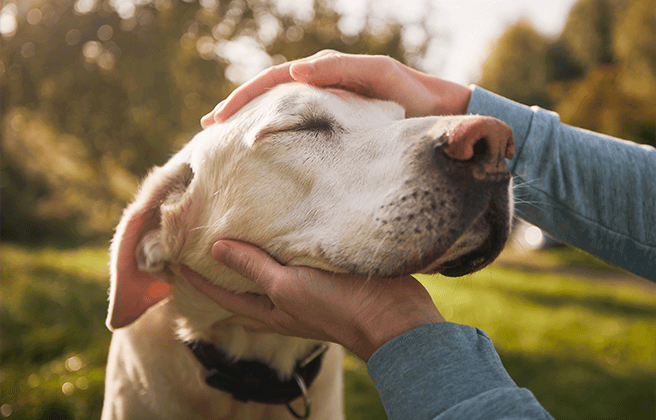
DogFoodAdvisor is reader supported See how
Dog Food Advisor is 100% impartial and is never paid to promote any brand. But if you buy using links on this page, we may earn a referral fee.
We all get older. So do our dogs, sadly at a faster rate. It can be hard to think about but it’s our happy duty as dog parents to make sure they have the best life possible, including in their later years.
A major part of a dog’s care is their diet — and you’ll have seen dog food marketed for senior dogs. But as your dog gets older, you might wonder if senior dog food is necessary, especially if they’re content with their current diet.
While not all older dogs require specialized diets, senior dog food can provide tailored nutrition to address the unique needs of aging pets, such as joint health, digestion, weight management, and overall vitality.
So, when is your dog a senior? And how do you know when it’s time to switch food?
This depends on their size and breed — smaller breeds typically enter their senior years around seven to eight years old, while larger breeds may become seniors as early as five years.
As always, consulting your vet can help determine if your dog is ready for a new diet and if switching to senior food would be beneficial. But in the meantime, you can read all about it below.
 Senior Dog Food”>
Senior Dog Food”>
What are the requirements for senior dog food?
“It’s a bit of a tricky one because senior dogs don’t have a specific AAFCO nutritional profile and fall under the ‘maintenance’ category, just like adult dogs,” says Laura Ward, DFA’s nutritionist.
“Therefore, many adult dog foods meet the ‘all life stages’ profile, which technically aligns with puppy food standards too, as puppies have the highest nutritional requirements. While these foods meet the needs of adults and seniors, they often exceed the necessary nutrition, potentially leading to weight gain unless portions are carefully controlled.
“There’s no set protein limit for any life stage, and while protein levels may decrease slightly in senior dog foods, there’s no defined range.
“Micronutrient levels can also vary significantly between brands, so it’s important to choose a food tailored to your dog’s specific needs, especially if they’re predisposed to certain conditions.”
What makes a senior dog food different?
Some dog food brands create formulas specifically tailored for older dogs, which can be highly beneficial. These senior dog foods are designed with nutrient balances that differ from puppy and adult formulas. Laura identifies the following differences:
- High-quality, moderate protein: Maintains lean muscle.
- Lower fat content: Helps prevent weight gain as activity decreases.
- Higher fiber: Supports digestion, satiety, and overall gut health.
- Key nutrients:
- L-carnitine: Aids in muscle maintenance and fat metabolism.
- Omega-3s: Supports brain, eye, skin, coat, and joint health while reducing inflammation.
- Joint support: Promotes mobility and reduces discomfort through specific ingredients.
- Oral health support: Addresses dental issues in older dogs through texture, shape, or added ingredients like seaweed or sodium hexametaphosphate.
“It often comes down to more specialized approaches that vary between foods,” explains Laura. “This could include differences in micronutrients, their bioavailability, specific ingredients, botanicals, or palatants to support appetite, as well as features like promoting hydration in older dogs.”
Is senior dog food necessary?
Switching to senior dog food isn’t a strict requirement at a certain age — it really depends on your dog’s individual needs.
“While some dogs may benefit from senior food as early as five, others remain active and thrive on their usual diet well into their later years. If you have a ten-year-old dog springing around like a puppy, don’t feel it’s necessary to change their diet,” says Laura.
As dogs age, much like humans, their metabolism slows, and they typically become less active. This makes it important to reduce calorie intake to prevent weight gain.

When should I switch my dog to senior dog food? When do dogs become seniors?
According to the American Veterinary Medical Association…
“…small dogs are generally considered senior at seven years of age. Larger breed dogs tend to have shorter life spans… and are often considered senior when they are five to six years of age.” 1
That said, every dog is unique, and there’s no magic age when the senior stage begins. Making small adjustments to their diet before signs of aging appear can make a big difference. Weight gain, for example, can sneak up on us and put extra strain on joints, increase inflammation, and lead to other health issues.
Keeping your dog happy and healthy as they age might mean switching to a senior formula, trying a lighter recipe, or adding omega-3s and joint support to their meals. Since every dog is different, it’s always a good idea to chat with your vet and make changes based on their specific needs — not just their age.
How do you know if your dog needs senior food?
The best approach is to keep a close eye on your dog as they enter their later years. Watch for signs like slowing down, muscle loss, or weight gain. Even if you don’t switch to senior-specific food, maintaining a healthy weight and body condition is key.
Supplements can also be a fantastic way to give your dog’s body a little extra support as they age, targeting areas like joint health, mobility, or overall vitality. It’s all about finding what works best for your dog to keep them happy and healthy in their golden years.
Does senior dog food make a difference?
A number of diseases are commonly associated with aging dogs, many of which can be influenced or managed with proper nutrition. For instance:
- Dental disease
- Obesity
- Cognitive dysfunction (dementia)
- Kidney disease
- Arthritis
- Skin diseases
While nutrition isn’t a magic cure, it can play a significant role in your dog’s health. For example, catching obesity early and reducing calories can help prevent strain on joints, while supplements for arthritis can improve mobility and comfort. Small adjustments to their diet can make a big difference in your dog’s well-being as they age.

Do dogs need to eat less as they get older?
As dogs age, it’s normal for their appetite to decrease since they’re generally less active. However, it’s important that they still eat enough to maintain a healthy weight.
If your dog is one of those who never seems to feel full (we’re looking at you, Labradors!), a lower-calorie, high-fiber food could be a great option. This way, you can keep their portion sizes the same while reducing calorie intake, keeping your dog satisfied and less likely to scavenge for extra snacks!
Do senior dogs need supplements?
“While technically, a complete and balanced food provides all the necessary nutrients, supplements can be a fantastic way to offer extra support as your dog ages,” says Laura. “By focusing on areas that are prone to wear and tear like joints, cognitive function, or skin — you might help keep those areas healthy for longer.”
Some senior dog foods already include functional ingredients like omega-3s or joint support, so doubling up isn’t always necessary. But if your dog has specific needs, targeted supplements can be a helpful addition to their routine. Always check with your vet before introducing anything new!
Final word
The Dog Food Advisor does not accept money, gifts, samples or other incentives in exchange for special consideration in preparing our reviews.
However, we do receive a referral fee from online retailers (like Chewy or Amazon) and from sellers of perishable pet food when readers click over to their websites from ours. This helps cover the cost of operation of our free blog. Thanks for your support.
For more information, please visit our Disclaimer and Disclosure page.
Sources
Article reviewed by
Laura Ward
Pet Nutritionist
Laura studied BSc (Hons) Animal Science with an accreditation in Nutrition at the University of Nottingham, before working for eight years in the pet food and nutrition industry.




